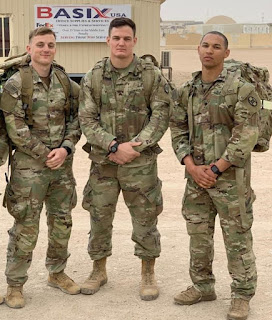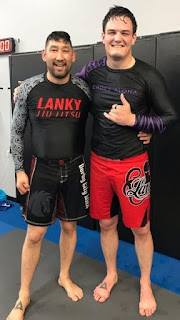Seasons of Training and Taking Time off of Jiu-Jitsu
Jiu-Jitsu is a unique animal in that it doesn't have seasons like most other sports have. I use the term sport here referring to the competitive aspects of Jiu-Jitsu, as opposed to the more typical Martial Arts training portions of the art form. A simplistic breakdown (that I'm stealing from my good friend Mark Lofthouse) of a typical sports season is:
1. Building and Preparation- This is the preseason were the focus is on preparing the body for the challenges of the upcoming season. This often involves a strength and conditioning program tailored specifically for the particular sport, as well as developing and improving upon technical skills that will be utilized.
2. Maintaining and Performing- This phase lasts for the duration of the season. The focus here is less on obtaining new skills, and instead on performing and tweaking what was developed in phase 1.
3. Recovering and Assessing- After the season is over phase 3 begins. Athletes throttle down training to rest and recover. This time is spent reviewing the performance that was conducted in phase 2, and planning for what will happen in phase 1 of the next year.
Jiu-Jitsu doesn't really have built in seasons like this though. If you don't mind logging a few miles, you can hit a tournament somewhere in the U.S. pretty much every single weekend of the year. Because Jiu-Jitsu doesn't have a natural competition season, the question I would ask is should athletes and instructors create one. This is something that I don't have the answer to, but would love to hear back on from seasoned competitors and coaches.
For myself, I have let the seasons of life dictate my competitive seasons. Training and competing as much as possible during down times, and throttling back intensity when things like military training or a loaded college semester demand a lot of time and attention. This has definitely led though to a much slower progress than some of my peers.
For example, a frequent question I'm asked when meeting new Jiu-Jitsu people is how long have you been training? That's a question that I never really know how to answer. I took my first Jiu-Jitsu class at a Jeff Curran seminar over 8 years ago. There we many breaks in between then and now though, and I didn't start consistently training until 3 years ago when I enrolled into Cornerstone BJJ. So to answer the earlier question could be 8 years or something like 4-5 years of actual time put into training. An interesting thing though is that when I started all those years ago, I had a teammate that was a slightly more seasoned white belt than I was. While I ebbed and flowed in my training consistency and intensity, this guy never let up. He kept showing up day after day, week after week for that entire 8 years. All of that hard work was rewarded last month when he was awarded his black belt.
Reflecting back on that time, I realize that while there were periods that I really couldn't fit training into my priorities, there were many times that I really could have fit in at least a night or two of class. Would I have made significant progress during that time? Most likely not, but it would have allowed for slow, steady progress that at a minimum would have kept the rust off.
We can't go back and time and change things, but we can look back and learn from what we did well or poorly at. I have since committed to myself that I will always keep at least one foot in the water no matter what life throws my way, and double down whenever given the opportunity.
Steven McMahon earned his Kyuki-Do Black Belt in 2011 from Grand Master Kim at Kim's Black Belt Academy and his BJJ Purple Belt in January 2017 under Professor Charles Nunley. He trains out of Cornerstone BJJ in Fayetteville, NC. He is an active competitor at Brazilian Jiu-Jitsu and Army Combatives tournaments.
1. Building and Preparation- This is the preseason were the focus is on preparing the body for the challenges of the upcoming season. This often involves a strength and conditioning program tailored specifically for the particular sport, as well as developing and improving upon technical skills that will be utilized.
2. Maintaining and Performing- This phase lasts for the duration of the season. The focus here is less on obtaining new skills, and instead on performing and tweaking what was developed in phase 1.
3. Recovering and Assessing- After the season is over phase 3 begins. Athletes throttle down training to rest and recover. This time is spent reviewing the performance that was conducted in phase 2, and planning for what will happen in phase 1 of the next year.
Jiu-Jitsu doesn't really have built in seasons like this though. If you don't mind logging a few miles, you can hit a tournament somewhere in the U.S. pretty much every single weekend of the year. Because Jiu-Jitsu doesn't have a natural competition season, the question I would ask is should athletes and instructors create one. This is something that I don't have the answer to, but would love to hear back on from seasoned competitors and coaches.
For myself, I have let the seasons of life dictate my competitive seasons. Training and competing as much as possible during down times, and throttling back intensity when things like military training or a loaded college semester demand a lot of time and attention. This has definitely led though to a much slower progress than some of my peers.
For example, a frequent question I'm asked when meeting new Jiu-Jitsu people is how long have you been training? That's a question that I never really know how to answer. I took my first Jiu-Jitsu class at a Jeff Curran seminar over 8 years ago. There we many breaks in between then and now though, and I didn't start consistently training until 3 years ago when I enrolled into Cornerstone BJJ. So to answer the earlier question could be 8 years or something like 4-5 years of actual time put into training. An interesting thing though is that when I started all those years ago, I had a teammate that was a slightly more seasoned white belt than I was. While I ebbed and flowed in my training consistency and intensity, this guy never let up. He kept showing up day after day, week after week for that entire 8 years. All of that hard work was rewarded last month when he was awarded his black belt.
Reflecting back on that time, I realize that while there were periods that I really couldn't fit training into my priorities, there were many times that I really could have fit in at least a night or two of class. Would I have made significant progress during that time? Most likely not, but it would have allowed for slow, steady progress that at a minimum would have kept the rust off.
We can't go back and time and change things, but we can look back and learn from what we did well or poorly at. I have since committed to myself that I will always keep at least one foot in the water no matter what life throws my way, and double down whenever given the opportunity.
Steven McMahon earned his Kyuki-Do Black Belt in 2011 from Grand Master Kim at Kim's Black Belt Academy and his BJJ Purple Belt in January 2017 under Professor Charles Nunley. He trains out of Cornerstone BJJ in Fayetteville, NC. He is an active competitor at Brazilian Jiu-Jitsu and Army Combatives tournaments.



Comments
Post a Comment